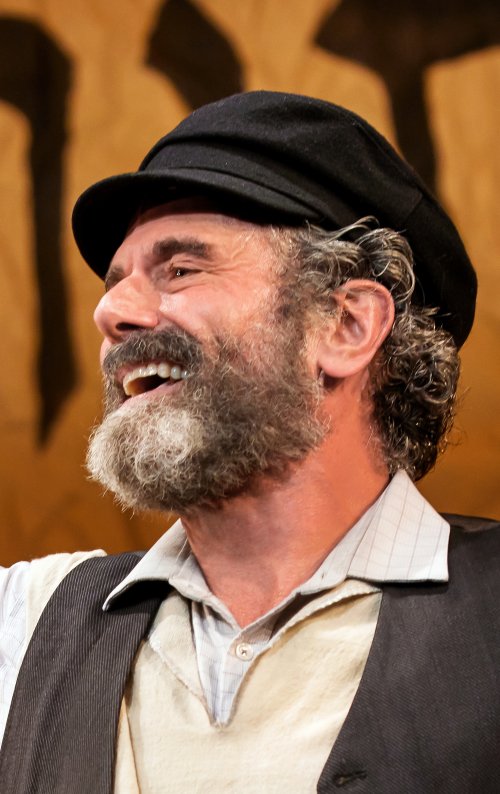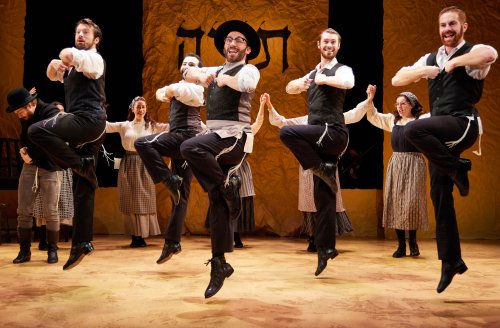
By: Darryl Reilly
The English translations projected onto Fiddler on the Roof in Yiddish’s side stage panels could be supplementary for the many theatergoers who are so familiar with this classic 1964 musical. After the two most recent tepid Broadway revivals, it is a profound joy to experience director Joel Grey’s beautifully simple Off-Broadway production which exuberantly embraces the show’s Jewishness via this lingual device of the dialogue and songs being performed in Yiddish. Visually arresting and emotionally stirring, this presentation is cause for kvelling and plotzing.
An accomplished and Oscar and Tony-Award winning actor for Cabaret, the now 90-year-old Mr. Grey grew up in show business as the son of Jewish comedian Mickey Katz and worked for Hal Prince and Bob Fosse. Grey has distinguished himself in his latter years as a theater director with his co-staging of the Broadway premiere of The Normal Heart. With Fiddler on the Roof in Yiddish, he demonstrates a dazzling command of stagecraft in service to this monumental material. There are grand performances, rich stage pictures, lovely tableaus and kinetic movement, all evoking the existence of early 20th century Eastern European Jewry.
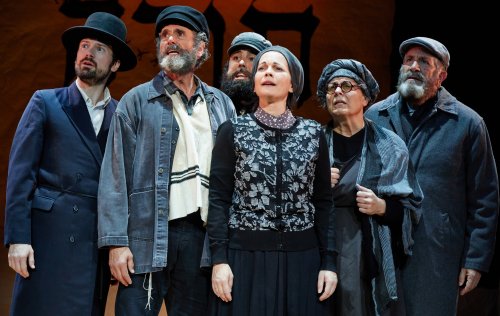
Staś Kmieć’s vivid musical staging and new choreography with nods to Jerome Robbins’ original work enforces Grey’s ethno-centric vision. “Tradition” is a rousing illustrative opening number. “To Life” in a tavern, marvelously integrates the dancing Russian men. “Tevye’s Dream” has a scary Fruma-Sore. “The Bottle Dance,” part of the wedding and pogrom sequence is spectacular. The poignant “Anatevka” incites collective weeping. These are just a few highlights of this novel and affective presentation.
As original author Sholem Aleichem’s Tevye, the weary philosophical milkman who has been married for 25 years, has five daughters and scrapes by in the anti-Semitic Ukraine of 1905, Steven Skybell is stupendous. The lean and animated Mr. Skybell forcefully brings authenticity to this historic part on every level. Combining humor, pathos and fluid physicality, Skybell offers a colossal characterization. His “If I Were a Rich Man” is towering and his “Chavaleh” is heartbreaking.
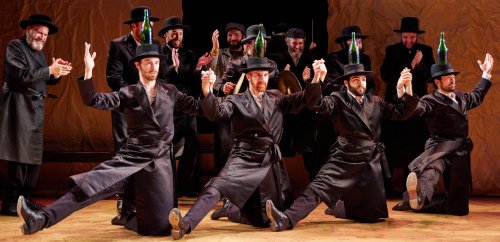
The entire large company of optically and temperamentally accurate cast members all turn in majestic performances. Jennifer Babiak as Tevye’s wife Golde, Lisa Fishman as Yente the Matchmaker, Ben Liebert Motl the Tailor, Stephanie Lynne Mason as daughter Hodl, Rosie Jo Neddy as daughter Khave, Michael William Nigro as the Russian Fyedka, Bruce Sabath as the Butcher Leyzer-Volf, Drew Seigla as Pertshik the fiery student, Rachel Zatcoff as daughter Tsaytl, each bring distinctive flair to their iconic roles. The physically imposing Adam B. Shapiro’s Rabbi is of subtle comedy and lowkey anguish and Lauren Jeanne Thomas’ jaunty silent Fiddler conveys affirmative crypticness.
Integral to the production’s success is Beowulf Boritt’s spare scenic design which has the stage’s walls covered in gleaming parchment, the center sheet has the Hebrew word “Torah,” the first five books of the Bible. The ripping of it by the Cossacks is chilling. A milk cart features prominently among the few necessary props. An open panel has the orchestra conductor on view. Mr. Boritt’s clever stripped down landscape allows the incidents and characters to be truly the focus of attention.
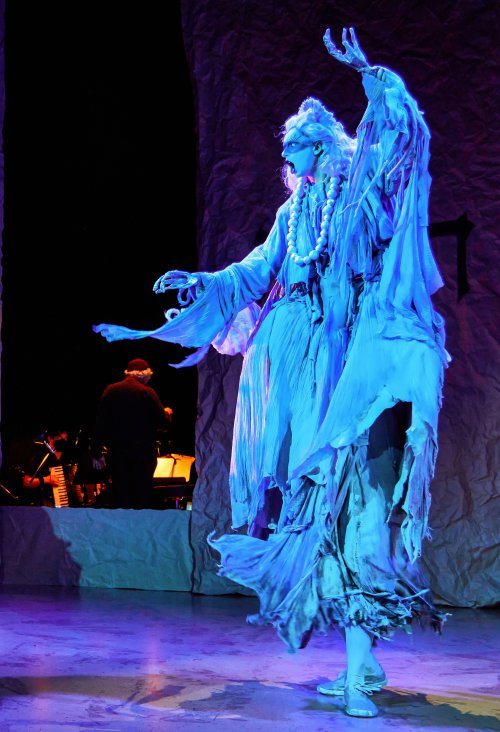
Apart from Fruma-Sore’s fabulously creepy shroud, costume designer Ann Hould-Ward smartly provides sedate rustic and formal garments for the Jews and flashy ethno-centric garb for the Russians, all imparting stylized realism. This feature is amplified by Tom Watson’s fine hair and wig design. Lighting designer Peter Kaczorowski perfectly bathes the stage in stark hues with occasional fantastical flourishes. Dan Moses’s deft sound design fully realizes the gloriously performed music, effects and spoken portions.
Joseph Stein’s flavorful book remains a sterling model of theatrical efficiency. The honed dialogue precisely imparts exposition while smoothly advancing the central plot of three of Tevye daughters’ complicated marriages, and seamlessly leads to the songs. The score comprised of one standard after another, by composer Jerry Bock and lyricist Sheldon Harnick is forever priceless. With perpetual national and international societal discord, the themes of the piece continue to resonate.
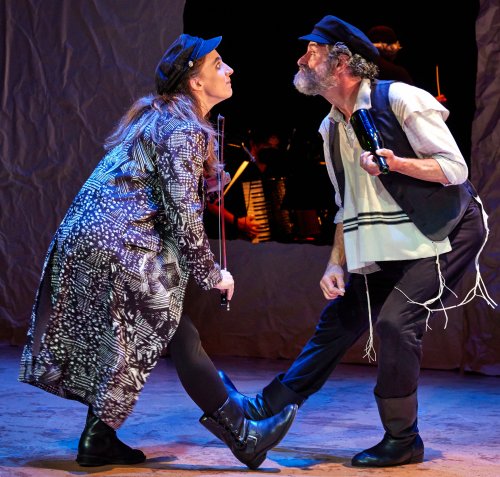
For the 1965 Israeli production of Fiddler on the Roof, notable actor Shraga Friedman (1924-1970) translated the book and score into Yiddish, adding more touches of Aleichem’s original short stories; that treatment is used here. Fiddler on the Roof in Yiddish with Steven Skybell as Tevye was first presented by the National Yiddish Theatre Folksbiene (NYTF) at New York City’s Museum of Jewish Heritage in July 2018, where it ran for five months and then transferred to Off-Broadway, winning awards. This welcome seven-week return engagement of that incarnation is a captivating event to enjoy during the holiday season.
Fiddler on the Roof in Yiddish (through January 1, 2023)
National Yiddish Theatre Folksbiene (NYTF)
New World Stages, 340 West 50th Street, in Manhattan
For tickets, visit www.nytf.org/fiddle
Running time: three hours with one intermission
